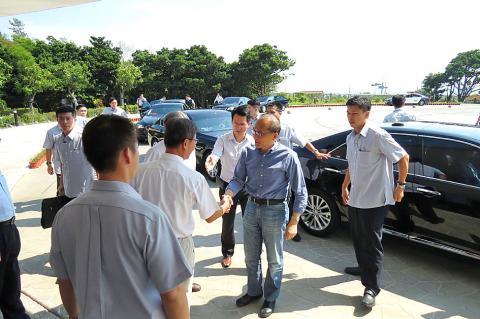The government will not extend the operating life of two of the nation’s nuclear power plants, Premier Lin Chuan (林全) said yesterday, while promising that electricity supply would remain stable.
During a visit to the Taipower Exhibit Center to meet with residents of New Taipei City — where the two plants are — to discuss issues such as dealing with nuclear waste, Lin said that the Jinshan Nuclear Power Plant in Shihmen District (石門) and the Guosheng Nuclear Power Plant in Wanli District (萬里) would be phased out according to the government’s schedule.
According to the schedule, the No. 1 reactor at the Jinshan plant is to shut down on Dec. 5, 2018, followed by the phasing out of the No. 2 reactor on July 15, 2019; and the Guosheng plant’s No. 1 and No. 2 reactors are to end operations on Dec. 27, 2021, and March 14, 2023, respectively.

Photo: Yu Chao-fu, Taipei Times
Lin sparked controversy in June when he said consideration should be given to restarting the first reactor at the Jinshan plant to ensure electricity supply during the peak summer season.
Lin yesterday said that one of the two reactors at each plant are already out of service and the government is pushing to transform the nation’s power supply structure.
He said that several options are available to ensure a stable supply of electricity.
“Currently, there does not seem to be a problem,” he said.
The first reactor at the Jinshan facility has been suspended since December 2014 after it underwent major maintenance. One of the reactors at the Guosheng plant has been out of service since April, when it also underwent major maintenance, but encountered a glitch in its electrical system.
Taiwan has three active nuclear facilities.
According to the policy of President Tsai Ing-wen’s (蔡英文) administration to create a nuclear-free homeland, Taiwan’s three operational plants are scheduled to be decommissioned by 2025, while the nearly completed Fourth Nuclear Power Plant in Gongliao District (貢寮), New Taipei City, is to remain mothballed.
Nuclear power has traditionally accounted for nearly 20 percent of Taiwan’s electricity production, raising questions about what will replace it when it is phased out.

Tropical Storm Gaemi strengthened into a typhoon at 2pm yesterday, and could make landfall in Yilan County tomorrow, the Central Weather Administration (CWA) said yesterday. The agency was scheduled to issue a sea warning at 11:30pm yesterday, and could issue a land warning later today. Gaemi was moving north-northwest at 4kph, carrying maximum sustained winds near its center of up to 118.8kph and gusts of 154.8kph. The circumference is forecast to reach eastern Taiwan tomorrow morning, with the center making landfall in Yilan County later that night before departing from the north coast, CWA weather forecaster Kuan Shin-ping (官欣平) said yesterday. Uncertainty remains and

SEA WARNING LIKELY: The storm, named Gaemi, could become a moderate typhoon on Wednesday or Thursday, with the Taipei City Government preparing for flooding A tropical depression east of the Philippines developed into a tropical storm named Gaemi at 2pm yesterday, and was moving toward eastern Taiwan, the Central Weather Administration (CWA) said. Gaemi could begin to affect Taiwan proper on Tuesday, lasting until Friday, and could develop into a moderate typhoon on Wednesday or Thursday, it said. A sea warning for Gaemi could be issued as early as Tuesday morning, it added. Gaemi, the third tropical storm in the Pacific Ocean this typhoon season, is projected to begin moving northwest today, and be closest to Taiwan on Wednesday or Thursday, the agency said. Today, there would likely

DISRUPTIONS: The high-speed rail is to operate as normal, while several airlines either canceled flights or announced early departures or late arrivals Schools and offices in 15 cities and counties are to be closed today due to Typhoon Gaemi, local governments announced last night. The 15 are: Taipei, New Taipei City, Taoyuan, Tainan, Keelung, Hsinchu and Kaohsiung, as well as Yilan, Hualien, Hsinchu, Miaoli, Chiayi, Pingtung, Penghu and Lienchiang counties. People should brace for torrential rainfall brought by the storm, with its center forecast to make landfall on the east coast between tonight and tomorrow morning, the Central Weather Administration (CWA) said. The agency issued a sea warning for the typhoon at 11:30pm on Monday, followed by a land warning at 11:30am yesterday. As of

CASUALTY: A 70-year-old woman was killed by a falling tree in Kaohsiung as the premier warned all government agencies to remain on high alert for the next 24 hours Schools and offices nationwide are to be closed for a second day today as Typhoon Gaemi crosses over the nation, bringing torrential rain and whipping winds. Gaemi was forecast to make landfall late last night. From Tuesday night, its outer band brought substantial rainfall and strong winds to the nation. As of 6:15pm last night, the typhoon’s center was 20km southeast of Hualien County, Central Weather Administration (CWA) data showed. It was moving at 19kph and had a radius of 250km. As of 3pm yesterday, one woman had died, while 58 people were injured, the Central Emergency Operation Center said. The 70-year-old